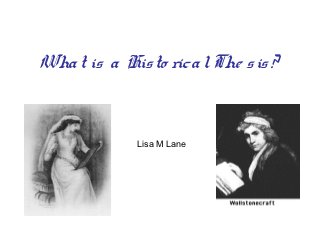
History 105: Writing a Historical Thesis
- 1. History 105: Writing a Historical Thesis Lisa M Lane
- 2. A historical thesis is kind of like a thesis for an English paper. It is a statement or sentence that you need to prove. You prove a thesis by presenting a brief argument and some evidence.
- 3. That evidence comes from the resources we have for this class. We want to use primary sources (writings or artworks created at the time we’re studying) whenever possible to support our theses.
- 4. In this online class, we will be developing historical theses for our posts and essays. You'll write a lot in this class, but you won't write any research papers. All the writing is in discussion forums and in your exams.
- 5. Photo credit: acordova on Flickr There is no research paper, because we're doing research all the time, finding new sources or working together, instead of saving up for a big individual project.
- 6. In the Sources and Writing forums, you'll post good primary sources that you find yourself. Then, later in the week, you will choose a few of these sources and pull them together to write about them. We’ll practice both gathering sources and writing about them every week.
- 7. Don't worry about how "good" your thesis is at first. It's a bit unnerving to post your work, get to know each other, absorb the facts, get used to the online format. But this introduction should at least let you know what I have in mind for your work, and mine, in this class.
- 8. Good: The British had a large empire because they gradually took over areas where they wanted to control trade. Bad: The British had a large empire because Martians forced their enemies to surrender. A good thesis takes the evidence into account, using the primary sources to prove a point. A "wrong" thesis is one that has no evidence - it can’t be proven.
- 9. A "bad" answer, one gets an F, is an answer that is plagiarized. It is copied from another source, without citing or referencing the original creator.
- 10. copyright Staples Inc By the end of the class, writing a thesis will be quick and easy, which will help you in all your classes, not just this one. At the same time, you'll gain understanding of historical patterns over time, because you'll be creating your own historical narrative as you work in this class. So let's get started!
